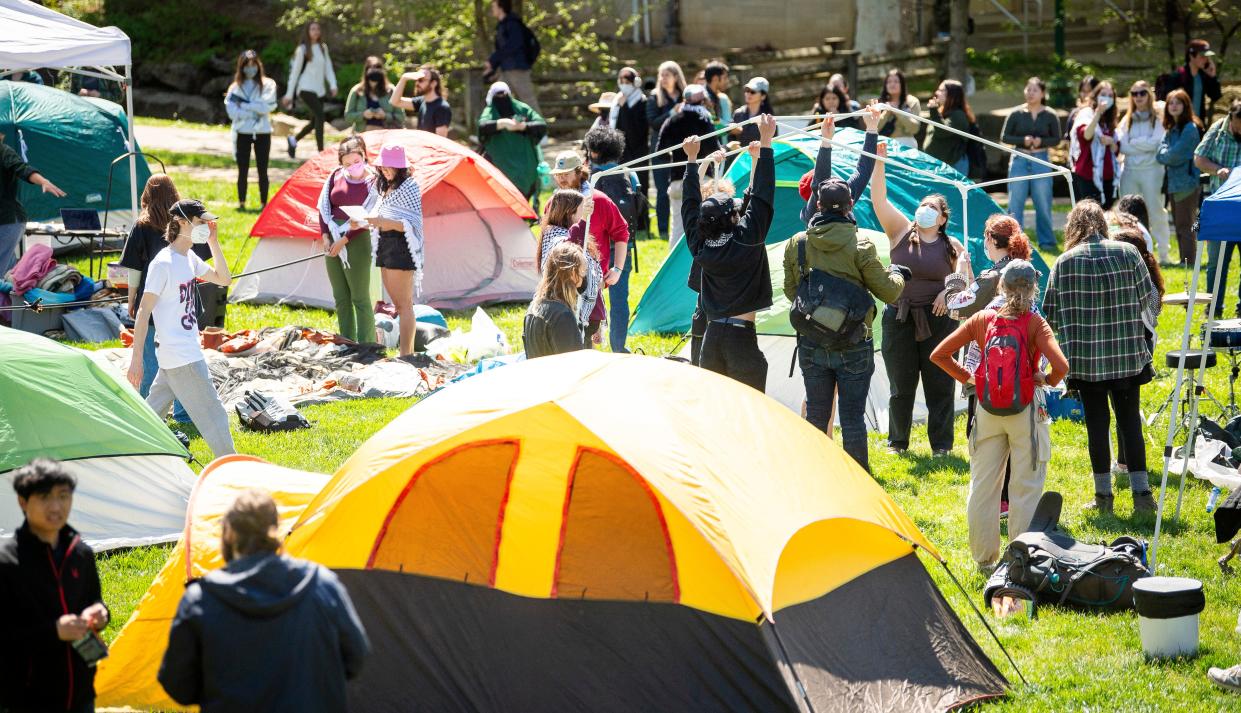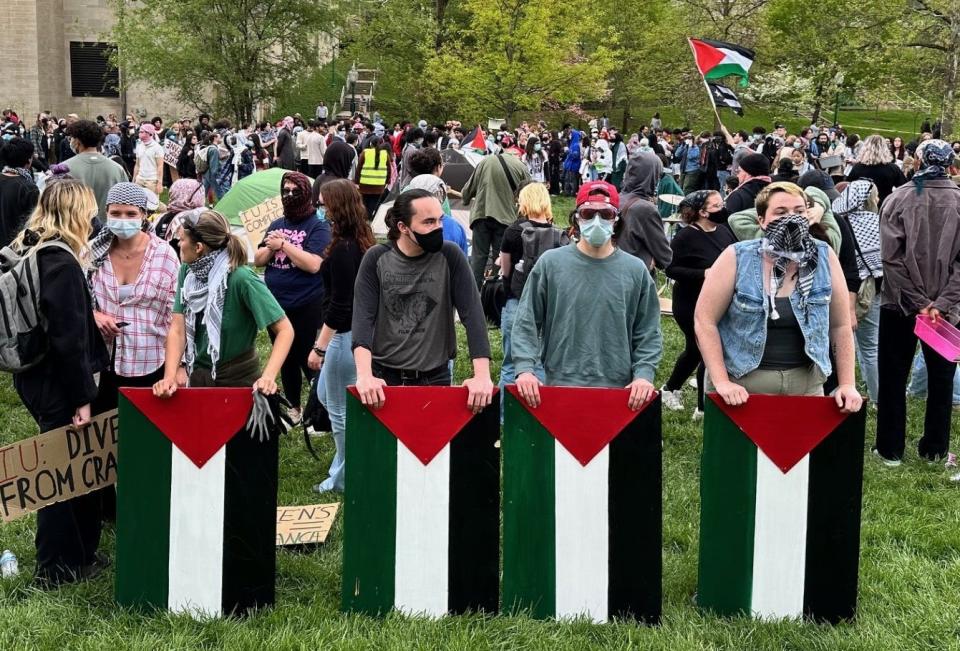'Serious First Amendment problem': A day before protests, IU changed a free assembly policy

On the eve of Thursday’s pro-Palestine protests , Indiana University changed a decades-old policy related to free assembly. Three legal experts said the university’s actions likely violated the Constitution.
The university on Wednesday, April 24, changed a policy that dates back to 1969. The change required that protesters obtain prior approval for signs and tents. Signs previously did not require approval. Protesters previously also could erect tents until 11 p.m.
University administrators said in an email that the changes were posted online and at Dunn Meadow Thursday morning, but some faculty, students and police on Thursday appeared confused about what was allowed and what wasn’t.
“You can’t change the speed limit while people are driving down the highway,” said Ken Paulson, director of the Free Speech Center at Middle Tennessee State University.
“Under those circumstances, the university’s actions … certainly appear to be censorship,” he said.
“I think it definitely raises concerns about viewpoint discrimination,” said Josh Bleisch, staff attorney for the Foundation for Individual Rights and Expression, a Philadelphia-based nonprofit.
Paulson and Bleisch, a 2019 graduate of IU’s Maurer School of Law, said government agencies, including universities, generally have broad leeway to establish restrictions on when, where and how people can express themselves.
However, they said, those restrictions must be, among other things, content-neutral, meaning universities cannot impose restrictions based on the speaker’s message and viewpoint.
The timing of Indiana University’s tent/sign policy change — on the eve of a planned protest related to the Israel-Hamas war — makes it look as though the university adopted the policy specifically for that protest.
“It certainly has the feel of changing the rules in the middle of the game,” Paulson said.
Steve Sanders, a Maurer school law professor, said, “I think this is a serious First Amendment problem.”
The First Amendment to the Constitution of the United States of America prohibits the government from, among other things, infringing upon people’s right to speak freely and to assemble peaceably.
Did IU violate its own policies in making the change?
Sanders and Bleisch also said the circumstances under which the policy was changed may have violated the university’s own policies.
In a statement shared by the university, IU President Pamela Whitten and Provost Rahul Shrivastav wrote on Thursday that an IU Board of Trustees policy that dates back to 1969 “includes a clear provision that the provost can pull together an ad hoc committee at any time to address specific changes that may be needed to the policy. Last night … the committee affirmed the right of peaceful protest, with the additional recommendation that temporary or permanent installation of structures in Dunn Meadow … must be approved in advance.”
However, Sanders said that justification “is a real misrepresentation of what was intended" by the 1969 policy.
That policy, he said, does not say the policy can be changed at any time by any group the provost calls together. Instead, the policy calls for the committee to provide ongoing advice on whether and how the policy should be changed.
Minutes from the board’s meetings in 1969 show the board stating the provost should create a committee “to give continuing advice” and that the committee should have power to review “denials of permission for uncarried overnight sings (sic), symbols or structures. Because that review should be prompt if it is ever needed, we think the committee should be very small” and should perhaps include the student government and faculty presidents as well as a member designated by the provost.
The university confirmed the committee Shrivastav called Wednesday included the IU chief of police, a vice president and two provosts — but no faculty member or student.
Sanders said the policy change was neither transparent nor compliant with IU’s own policies.
Bleisch, too, said, “I think that’s another big problem.”
The exact process by which protesters can obtain prior approval for signs and tents was unclear. The policy online specifies only that approval may be granted by the Office of the Vice Provost for Student Life, in conjunction with University Events. How or how long before an event such requests have to be made was not spelled out.
For much of Friday, the second day of protests, the tents students had erected on Dunn Meadow went unmolested by authorities.

The professors agreed that if the university had decided to make changes to the long-standing policy after careful deliberation and proper notice, the change very likely would not have been problematic.
“What makes this different is that it is done in the heat of the moment and intended to have an impact on students who are exercising their First Amendment rights,” Paulson said.
“It’s a bit mind-boggling that a major university would take that step so suddenly,” he said.
Paulson said the new policy, if adopted under different circumstances, might not pose much of a burden for protesters, given they would still be able to protest on Dunn Meadow, including overnight. However, Bleisch said the prior policy already had successfully balanced for many decades the interests of the university, faculty and students. That begs the question as to why the policy was changed now.
The university denied a request for an interview with Shrivastav. IU spokesman Mark Bode said the university would not respond to the law professors’ comments.
In their statement, Whitten and Shrivastav said the protest in Dunn Meadow “required us to balance our commitment to free speech activities with the need to ensure safety and security for our campus community.”
The administrators said they “thoughtfully considered the best course of action for IU with the safety of our community being foundational to our decision. We know that not all will agree with the course of action, but this was made through careful deliberation.
“Our university must create space for meaningful dialogue, while ensuring that our campus is safe and welcoming to all, and that peaceful protest, as many experienced today, symbolizes our steadfastness to the free expression of ideas.”
Whitten and Shrivastav also wrote that they brought in Indiana State Police as a "law enforcement partner" on Thursday because of the expected "high number of external participants." Police arrested 33 protesters.
The board's minutes from 1969 also address enforcement of the public assembly rules: "We believe the University should not use physical force to enforce these rules. In cases of non-compliance, the University should use the legal process to enforce its legal rights."
Boris Ladwig can be reached at bladwig@heraldt.com.
This article originally appeared on The Herald-Times: 'Serious First Amendment problem': IU changed policy on eve of protests

